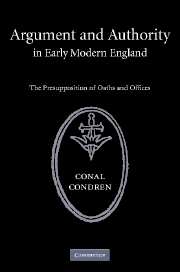Epilogue
Published online by Cambridge University Press: 28 October 2009
Summary
I know what Persona means in the Dictionary, and therein lies all your Divinity. And therefore, I say … Farewell.
(John Eachard, A Second Dialogue, 1673)Like Burnet's depiction of the reign of James II, the web of office has been broken, though by no single act. Dealing with language is, remarked Wittgenstein, like trying to mend a cobweb with your fingers, and it would be fruitless to try such a repair now. Cobwebs, however, do stick and can at a pinch bind wounds. Office has had an arachnidean virtue of tenacity, even in the processes by which it has been over-stretched, torn and used to patch up the fissures in later notions of what counts as ethical conduct and political theory. So what has happened to the spider and what help might an enhanced understanding of office provide? It is a difficult question, not least because it has to be asked almost at the same time as it has been powerfully argued that the modern state arose as a consequence of official entanglements: institutionalised offices became more formalised, and their functions were extended, in which processes a controlling centre became more robust. If true, is this a case of the offspring consuming the parent; if the state is the result, what has happened to notions of office?
I have looked at a world in which some tacit understanding and expectation of office shaped the moral argument of early modern England, argument that was neither driven exclusively by a universalist deontology, nor by consequentialism.
- Type
- Chapter
- Information
- Argument and Authority in Early Modern EnglandThe Presupposition of Oaths and Offices, pp. 343 - 352Publisher: Cambridge University PressPrint publication year: 2006

